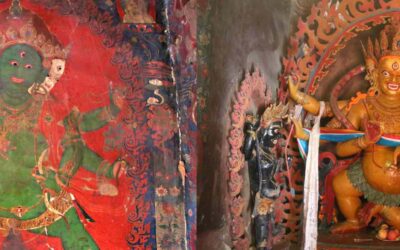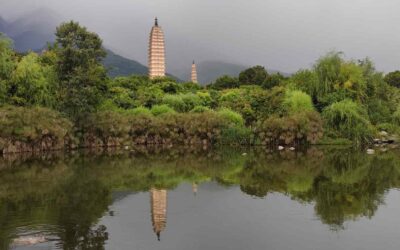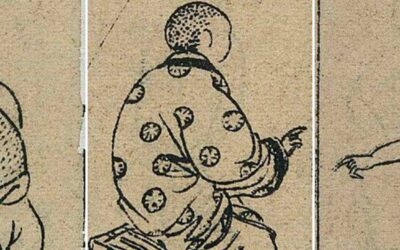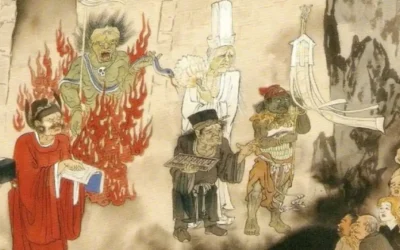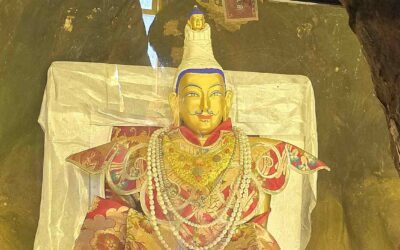The sacred forests of the Dai: Protecting the ancestors – protecting nature.
Among the indigenous peoples that inhabit the south of China, there are a good number that have near their villages a small grove that they consider sacred. Usually they believe that this forest is the place that the protective spirits of the village inhabit; they maintain taboos in order to impede any activity that can deteriorate it. The Daile who live in the south of Yunnan Province, in Xishuangbanna Prefecture, in spite of being nominally Buddhists for more than 1000 years; still preserve vestiges of their indigenous religion. We see this in several customs, including the respect for these sacred groves. In fact, the Daile people say:
«Buddhism is for the future life, but the cult of the gods of the village is what can help in the present.»
Almost every Dai village has its small sacred forest, where the clan’s ancestors, who are the protective gods of the village, are believed to live. The animals of those forests, the plants, the earth and the water, everything is sacred and cannot be taken away. It is totally forbidden, not only to cut trees, but to take anything, to hunt, to cultivate the earth, and even to gather the fruits of the trees that are left to rot in nature. In fact, during most of the year, except on the two occasions when ceremonies in honor of the ancestors are carried out, people usually don’t even enter these forests. A study carried out by Mr. Gao Lishi (1) has calculated that in only the prefecture of Xishuangbanna, the sacred forests of the Dai people protect a total of 100,000 hectares, comprising approximately five percent of its total area. In his study he has concluded that due to their long interaction with the forces of nature, the Dai understand that without forests, there is no water, and without water they could not cultivate the rice on which they depend to survive, neither could they fish to supplement their diet. The prefecture of Xishuangbanna is unique in China. For it’s semi-tropical climate and abundance of flora and fauna, it enjoys special protection, as demonstrated by the declaration of numerous Nature Reserves and the development of a model of tourism that largely focuses on a respect for nature. Today almost one third of Xishuangbanna is protected forest. Recent studies have evaluated in a scientific way the purpose these sacred forests serve in the conservation of nature. Their conclusions show that they carry out several fundamental purposes: 1. Protection of biodiversity. Since inside these forests the number of vegetal and animal species is far larger than outside. 2. Protection of the soil and atmospheric humidity. 3. Oxygen production. 4. Protection of animals that fight in a natural way against agricultural plagues. As a quiet place which people rarely enter, these forests are a favorite nesting place for different species of birds, that can later play a crucial role in the natural control of plagues. 5. Natural protection against tempests, fires and climatic changes. 6. Protection of the culture and traditions of the Dai. We see once again that indigenous knowledge, so often underestimated by the national majorities, has usually evolved through a long interaction with nature, and the desire to protect it arises from a belief that to protect nature is to protect their own lives. It is interesting to observe how the majorities are now realizing that modern exploitation of the resources of many minority regions cannot be successful if the indigenous traditions of these areas are not borne in mind. This is because the local peoples have long known how to appropriately use and conserve these lands, as pioneers of what is now referred to as sustainable development. (1) Gao Lishi. – Dai zu «longlin» chongbai dui shengdai gongxian huanbao (Contribution of the sacred forests of the Dai to the protection of nature). In «Dai zu wenhua lun» (Discussions about Dai culture) Yunnan Nationalities Press. Kunming. 2000
More posts on China ethnic groups
Parnashavari. La diosa tibetana de la medicina
Parnashavari. La diosa tibetana de la medicina. Dentro de la compleja simbología de las deidades y protectores tibetanos, me gusta ir buscando algún detalle que permita identificar claramente a un personaje desde el primer momento en que le vemos en un templo. Una de...
Viaje-Todo -Yunnan
TODO YUNNAN - EL CAMINO A SHANGRILÁ DESCARGA AQUÍ EL PROGRAMA ILUSTRADO Día 1. Kunming. Traslado al hotel Grand Park. Día 2. Kunming- Shilin. Desayuno. Alojamiento Htl Yinruilin Empezamos las visitas de Kunming. Nos dirigimos primero al Templo Yuantong, el más...
La Diosa de la Viruela Doushen
La Diosa de la Viruela Doushen La Diosa de la Viruela (Doushen痘神) forma parte de una serie de diosas encargadas principalmente de la protección de los niños, que en los últimos años del régimen imperial actuaban bajo la dirección de Bixia Yuanjun, hija del Emperador...
Viaje-Yunnan-Tibet
YUNNAN – TIBET 2026 DESCARGA EL PROGRAMA ILUSTRADO Día 1. Llegada a Kunming. Htl Grand Park Tiempo libre para pasear tranquilamente por la ciudad antigua, el Mercado de los Peces y los Pájaros, etc. Día 2. Kunming - Weishan. Desayuno + almuerzo. Hotel Xiongzhao Por...
La solución a la epidemia de suicidios de Occidente se encuentra en la cultura de un pueblo del Himalaya
La solución a la epidemia de suicidios de Occidente se encuentra en la cultura de un pueblo del Himalaya. En los últimos años se ha disparado el número de suicidios entre los jóvenes. En algunos países, como España, ya han superado a los accidentes de circulación como...
Drak Yerpa: Los acantilados para la meditación tibetana
Drak Yerpa: Los acantilados para la meditación La visita a los acantilados de Drak Yerpa, a unos 30 kilómetros de Lhasa, aparte de proporcionar una idea de la belleza del paisaje tibetano y de algunos asentamientos rurales cerca de la capital, nos proporciona la...


